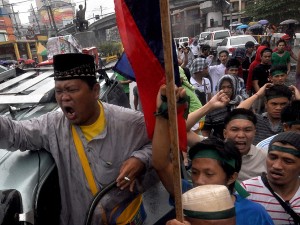Filipino Muslim leaders caution against violence in protesting anti-Islam video

Muslims march to Mendiola, Manila to call for the government to block the anti-muslim film ‘The Innocence of Muslim’ whose trailer is being shown on YouTube. RICHARD A. REYES/Inquirer
ZAMBOANGA CITY, Philippines—Muslims, no matter how hurt they are, should not resort to violence in protesting against the anti-Islam film, “The Innocence of Muslims”, Muslim clerics in Mindanao said.
Ustadz Al Mahdi Baginda of the National Ulama Conference said while the film ridiculed the Prophet Muhammad, “reacting violently will not make us different from the one who created the film.”
He said it was clear that the filmmaker was trying to incite violence among Muslims because it can also justify the story portrayed in the film.
The film initially showed Egyptian Muslims attacking Egyptian Christians and burning their homes while Egyptian police forces, who are also Muslims, just watched and stood from a distance.
The rest of the film depicts scenes featuring the main character, referred to as the Prophet Muhammad.
In the film, Muhammad’s wife, Khadija, also suggests that the Koran should be written by mixing verses from the Torah (the Jewish holy book) and the New Testament.
“Trivializing and mocking the personality of the holy prophet to us is blasphemous,” said Sheik Jamal Munib, chair of the National Ulama Conference of the Philippines for the Zamboanga-Sulu-Tawi-Tawi area.
But Munib said even then, Muslims should not be “easily provoked and trapped to become violent in our reaction because this kind of move is also contrary to the personality, the behavior and attitude of our holy prophet.”
The clerics said Muslims can still show their protest by joining a petition aimed at convincing Google to remove the 14-minute trailer of the film from its video-sharing site YouTube.
Google had earlier said it was not removing the film because doing so would violate freedom of expression.
“We do respect the sanctity of the principle of freedom of expression but we also believe it must be coupled with social responsibility,” Munib said.
Lawyer Yasser Apion of the National Commission on Muslim Filipinos in Western Mindanao said they will also be writing Google about the film.
Apion lauded the city council for recently passing a resolution banning the showing or distribution of the film here.
He said another petition has been drafted which seeks support from the city council to declare Nakoula Basseley Nakoula, the Egyptian-born producer of the film, and the cast as personae non gratae.
Meanwhile, the so-called running priest Robert Reyes said he shared the “outrage against the anti-Islam video.”
“I am happy that the Supreme Court banned the public showing of the video anywhere in the country and I hope that President Aquino still see the case beyond the freedom of expression. It is not only our sister and brother Muslims’ religious sensibilities that have been hurt and wounded,” Reyes said.
He said an online campaign could also be used to convince Google to remove the offensive film.
“There are definitely better ways of using modern communication technologies rather than the paltry way of religious ridicule, which is in many ways not too different from porn, of which YouTube, unfortunately is also known for,” Reyes said.